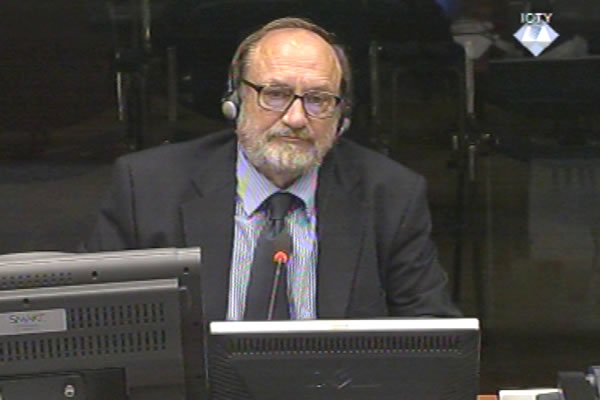Home
WAS KARADZIC ‘AGGRESSIVE’ OR ‘VIOLENT’?
In his statement to the defense, witness Nikola Poplasen described Radovan Karadzic as a ‘patient’ president with no authority. This prompted the prosecutor to remind the witness about his previous testimony in The Hague, when he said Karadzic was ‘aggressive’ and had a ‘decisive authority’. Poplasen replied that he didn’t say Karadzic was ‘aggressive’ but ‘violent’. According to Cvijic’s typology, that is a feature of the Dinaric type of personality
 Nikola Poplasen, witness at the Radovan Karadzic trial
Nikola Poplasen, witness at the Radovan Karadzic trial One of Radovan Karadzic’s post-war successors in the office, a former Republika Srpska president Nikola Poplasen, gave evidence today in Karadzic’s defense. Poplasen used to be a member of the Radical Party. Now he is a university lecturer and still holds the rank of a Chetnik vojvoda. At the very beginning of the conflict in BH, from April to June 1992, Poplasen served as an advisor in the Pale Presidency. He was then appointed Karadzic’s war commissioner in the Vogosca municipality in Sarajevo.
The accused read out the summary of the witness’s statement to the defense. Poplasen said that during the war the people left their homes voluntarily, in a bid to flee the chaos of war and uncertainty. Poplasen denied the role of the municipal crisis staffs and war presidencies in the persecution of the population and denied the responsibility of top echelons in the government. Radovan Karadzic was in favor of ‘truth, justice and the rights of all citizens’, Poplasen claimed. Sometimes Karadzic was so ‘patient’ that Poplasen felt he was a ‘leader with no authority’. In mid-1992 Poplasen insisted on the ‘full reunification’ of Republika Srpska and Republic of Serbian Krajina’ but Karadzic rejected the proposal. This ‘deepened’ the differences between the two, and would later result in their political parting of ways.
In the cross-examination, prosecutor Edgerton remarked that in his evidence in Momcilo Krajisnik’s defense in 2006, Poplasen said Karadzic’s influence over the authorities was ‘important and decisive’. Karadzic was ‘aggressive’, Poplasen had said then; in his statement to Karadzic’s defense, he contradicted this claim, depicting Karadzic as a ‘patient man’ ‘with no authority’. The witness explained that the accused wielded influence not as an individual but as the president of the party with an absolute majority in the parliament. Poplasen stressed that he didn’t say Karadzic was ‘aggressive’: he used the term ‘violent’. As he explained, this is the term used in Cvijic’s typology to describe the ‘Dinaric personality type’. This type of person is not aggressive but reacts ‘tempestuously and justly’ to illegal actions.
In the statement, Poplasen notes there was no ethnic discrimination in Republika Srpska. The prosecutor showed a decision of the authorities in Celinac municipality, dated 23 July 1992. Croats and Muslims were prohibited from leaving their homes from 4pm to 6pm, they were not allowed to swim in the river, to fish, or to gather in large groups. The only thing they were explicitly allowed to do was to leave the municipality, but only if the entire household wanted to leave. Poplasen explained that the municipal authorities imposed the restriction because they wanted to ‘protect’ the population and ‘save people’s lives’. Poplasen was then showed a document produced by the Sanski Most authorities in July 1992, which specifies that the Serb employees in public companies were entitled to paid leave, while the others could only take unpaid leave. The witness admitted that it was a discriminatory decision adding that his conclusions about the non-discriminatory nature of the Serb authorities were based only on the situation in Vogosca.
This prompted the prosecutor to note that there were prison facilities in Vogosca where non-Serb civilians were detained and taken out to do forced labor on the front lines. In his statement to the defense, Poplasen said that in 1992 he had visited one such site, the Sonja Motel, and had immediately demanded from the Presidency in Pale to make all prison facilities part of the legal system. The prosecutor told him that after he took this action, the prisoners were removed from the motel to a location called Planjina Kuca and then to the front where they had to do forced labor. The witness said that the Sonja Motel didn’t seem to him to be a prison facility, but a place where people could come and go as they wished, to have ‘some breakfast and tea’. In the witness’s view, sending non-Serb civilians to the front line was part of ‘compulsory work service’, which was ‘a privilege’ compared to military service.
Next week, Radoslav Brdjanin, former president of the Autonomous Region of Krajina, will testify at Karadzic’s trial and his evidence will be followed by the cross-examination of Momcilo Krajisnik.
Linked Reports
- Case : Karadzic
- 2013-11-14 WHY DID KARADZIC TOLERATE BRDJANIN’S ‘IDIOTIC’ ACTIONS?
- 2013-11-13 KRAJISNIK’S DEMOCRATIC ASSEMBLY
- 2013-11-12 KRAJISNIK NOW DENIES RESPONSIBILITY HE HAD (PURPORTEDLY) ACCEPTED
- 2013-11-18 BRDJANIN SORRY HE COULD NOT BE TRIED ON ‘NEW STANDARDS’
- 2013-11-19 KRAJISNIK IS ‘NOT CREDIBLE’ AS WITNESS
- 2013-11-20 MILOSEVIC’S ‘NASTY WORDS’ ABOUT KARADZIC AND KRAJISNIK
